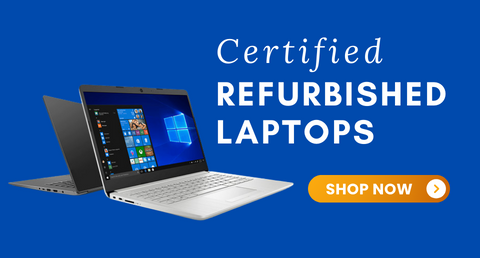Refurbished Laptops: Where Quality Meets Economy

Introduction
In our fast-paced digital age, owning a reliable laptop has become a necessity for both personal and professional endeavors. However, finding the perfect balance between quality and affordability can often be a daunting task. This is where the concept of refurbished laptops steps in, offering a compelling solution for tech-savvy individuals who seek top-notch performance without burning a hole in their wallets.
In this era of rapid technological advancements, the term ‘refurbished’ no longer implies compromise. Instead, it signifies a smart and eco-conscious choice that allows consumers to access high-quality computing devices at a fraction of the cost. In our exploration of this dynamic landscape, we delve into the world of Refurbished Laptops, where Quality Meets Economy.
The Benefits of Choosing Refurbished Laptops
In a world where technology evolves at an unprecedented pace, owning a laptop that meets your needs without breaking the bank is a coveted achievement.
Cost-Effective:
Perhaps the most obvious benefit, refurbished laptops cost significantly less than their brand-new counterparts. This allows individuals to access high-quality computing power without depleting their savings. It’s a frugal choice that doesn’t compromise on performance.
Environmental Responsibility:
Refurbished laptops are environmentally friendly options. By extending the lifespan of these devices, you contribute to reducing electronic waste and conserving resources.
Quality Assurance:
Reputable refurbishment processes involve rigorous testing, cleaning, and repairs. This ensures that the laptop is in excellent working condition.
Up-to-Date Hardware:
Refurbished laptops often feature hardware upgrades and the latest operating systems. This means you can enjoy modern features and performance at a fraction of the cost of a new laptop.
Variety and Availability:
The refurbished market offers a wide variety of laptop models from different manufacturers. Whether you need a powerful workhorse, a compact ultrabook, or a gaming laptop, you’re likely to find a refurbished option that suits your requirements.
Customization:
Some refurbished laptops allow for customization, giving you the flexibility to choose specific components like RAM and storage, tailoring the device to your needs.
Reliability:
Due to the rigorous testing and quality control processes, refurbished laptops can be just as reliable as new ones. In some cases, they may even be more reliable, as potential defects are addressed during the refurbishment process.
Tech Support and Warranty:
Reputable refurbishers often offer customer support and warranties, giving you a safety net in case of any issues. This level of support is not always available for used or second-hand laptops.
Learning Opportunity:
Refurbished laptops can be an excellent choice for students, allowing them to access the technology they need for their studies without straining their budgets.
Resale Value:
If you decide to upgrade or change your laptop in the future, a refurbished laptop may still retain some resale value, making it a financially savvy choice in the long run.
Tips for a Secure and Satisfying Purchase of a Refurbished Laptop
Purchasing a refurbished laptop can be a great way to save money while still getting a reliable computing device.
Buy from Reputable Sellers:
Research and choose established sellers or manufacturers known for their quality refurbishment processes.
Check Warranty:
Prioritize refurbished laptops that come with a warranty. This offers peace of mind and protection against any unforeseen issues. Be sure to understand the warranty terms and duration.
Understand the Refurbishment Process:
A comprehensive process should include thorough testing, cleaning, and replacement of faulty components. Ensure that it meets industry standards.
Ask About Return Policy:
Familiarize yourself with the return policy. This is crucial in case the laptop does not meet your expectations or has hidden defects. Make sure you can return or exchange it hassle-free.
Verify Specifications:
Double-check that the laptop’s specifications match the description. Ensure it has the desired hardware, storage, and features you’re looking for. Some sellers may allow for customization.
Inspect for Physical Damage:
Examine the laptop for any physical damage, scratches, or dents. While cosmetic issues are expected with refurbished devices, major damage should be a red flag.
Battery Health:
Inquire about the laptop’s battery health. Batteries degrade over time, so make sure it has sufficient capacity for your needs. Some sellers may replace the battery during refurbishment.
Operating System and Software:
Verify that the laptop comes with a genuine operating system and necessary software licenses. Ensure that it is not pirated or unlicensed.
Compare Prices:
Keep in mind that very low prices might indicate subpar refurbishment or potential hidden issues.
Customer Support:
Assess the availability of customer support. Reputable sellers should offer support in case you encounter problems with your refurbished laptop.
Payment Security:
Use secure payment methods when making your purchase. Avoid sharing sensitive information through unsecured websites or unverified payment gateways.
Read the Fine Print:
Carefully read and understand the terms and conditions of the sale, including the warranty, return policy, and any hidden costs such as shipping or taxes.
Ask Questions:
Don’t hesitate to ask questions about the laptop’s history, refurbishment process, and any concerns you may have. A transparent seller should be willing to provide information.
Consider Certified Refurbished:
Some manufacturers offer “certified refurbished” laptops. These have typically undergone more rigorous testing and come with manufacturer-backed warranties.
Stay Informed:
Keep up to date with the latest technology and laptop models. This knowledge will help you make an informed decision and identify whether a refurbished laptop is a good fit for your needs.
Choosing the Right Refurbished Laptop for Your Needs
Selecting the perfect refurbished laptop requires careful consideration of your specific requirements.
Identify Your Use Case:
Determine how you plan to use the laptop. Are you a student, professional, gamer, or casual user? Different use cases require different specifications.
Set a Budget:
Decide how much you’re willing to spend. Refurbished laptops offer cost savings, but it’s essential to have a clear budget in mind to narrow down your options.
Consider Size and Portability:
Think about the laptop’s size and weight. Smaller laptops are more portable, but larger ones often have bigger screens and better performance.
Choose an Operating System:
Decide between Windows, macOS, or Linux, depending on your familiarity and specific software requirements.
Select the Right Hardware:
Consider the following hardware components:
Processor (CPU):
Opt for a processor that suits your needs, such as an Intel Core i5 or i7, or an AMD Ryzen equivalent.
RAM:
Choose an appropriate amount of RAM (8GB or more for most users).
Storage:
Decide between a traditional HDD, SSD, or a combination for faster performance.
Graphics Card (GPU):
Gamers and professionals may require dedicated graphics, while casual users can do fine with integrated graphics.
Battery Life:
Think about how long you need your laptop to run on battery power. Longer battery life is crucial for frequent travelers and students.
Display Quality:
Consider the display’s resolution, brightness, and color accuracy. A Full HD (1080p) screen is standard, but some users may require higher resolutions.
Keyboard and Touchpad:
Test the keyboard and touchpad if possible. A comfortable keyboard and responsive touchpad are essential for productivity.
Check the Refurbishment Quality:
Inquire about the refurbishment process to ensure it includes thorough testing, cleaning, and component replacement if needed.
Brand Reputation:
Brands like Dell, HP, Lenovo, and Apple are known for their reliable laptops. Consider sticking with reputable brands.
Read Reviews:
Look for reviews from experts and other users to gain insight into the laptop’s real-world performance and any common issues.
Consider Future-Proofing:
Think about your laptop’s longevity. Choose a laptop with upgradable components if you plan to extend its lifespan by upgrading RAM or storage.
Warranty and Support:
Opt for a refurbished laptop that comes with a warranty. Check if the seller offers good customer support in case you encounter problems.
Personal Preferences:
Consider personal preferences such as aesthetics, build quality, and any special features that are important to you.
Check for Deals:
Keep an eye out for discounts, promotions, or bundle offers from reputable sellers. You might find a great deal that fits your needs and budget.
Conclusion
Choosing a refurbished laptop that meets your specific needs is a smart and cost-effective decision in the world of computing. These laptops offer a blend of quality and affordability, catering to a wide range of users.
In summary, the world of refurbished laptops offers a win-win solution where quality meets economy. By following the guidelines and tips outlined in this discussion, you can confidently select the ideal refurbished laptop that perfectly suits your needs, all while enjoying substantial cost savings and contributing to a more sustainable tech landscape.




